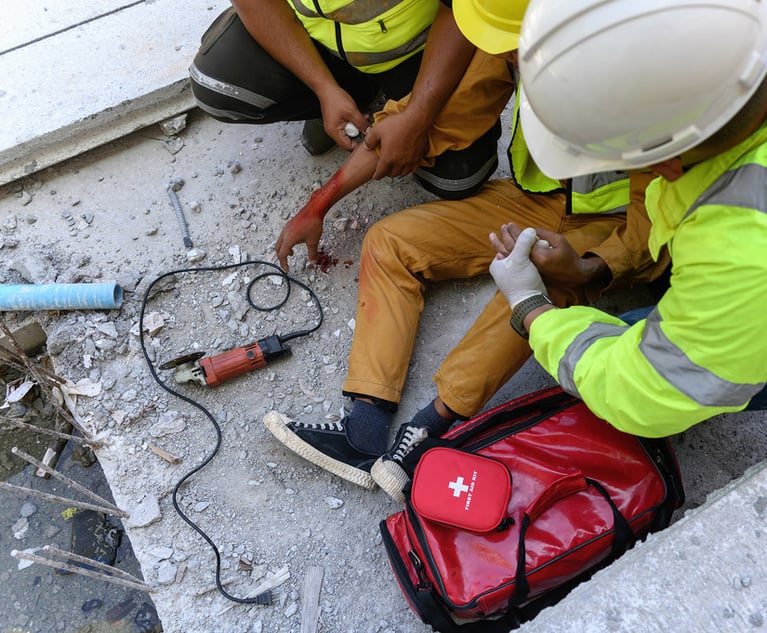Insurance Coverage in the Wake of NJ's Extended Statute of Limitations for Child Sex Abuse
Companies must prepare to find their insurance policies and pursue their coverage claims.
July 05, 2019 at 02:00 PM
7 minute read
 istockphoto.com
istockphoto.com
New Jersey has enormously extended the statute of limitations for child sex abuse crimes. The new statute allows childhood victims of sexual molestation to file suit until they turn 55, or until seven years from the time that they became aware of their injury, whichever comes later. Further, for those previously barred from seeking recovery, the law establishes a two-year window to file suit.
Childhood sex abuse litigation is already well-established in the legal firmament. The Catholic Church has been the most notorious target of such suits, but everyone from universities to daycare centers to the Boy Scouts to private schools has been affected. With the extension of the statute of limitations, New Jersey can expect the floodgates for this litigation to open even more widely.
While it is satisfying for the victims to see their abusers punished via the criminal justice system, the abusers are not the chief targets for those victims seeking monetary damages in civil lawsuits. Such relief generally comes from the institutions that employed the abusers and serve as the so-called “deep pockets” in abuse litigation. Those institutions must realize that they have insurance coverage for these types of claims.
Lost Policies
Insurance coverage for institutions named in suits alleging sexual abuse by employees exists under the general liability insurance policies in effect when the abuse occurred. General liability policies are occurrence-based and provide coverage when the bodily injury took place within the policy period, as opposed to claims-made policies, which provide coverage when the claim is made within the policy period. Insurance coverage for an allegation of sexual abuse that took place in 1970 exists under the 1970 general liability policy. If sex abuse took place over several years, the general liability policies in each of those years must respond.
Of course, many institutions do not save their old liability insurance policies, or know where to look for evidence of them. The institution must recognize that it can prove the existence of insurance through secondary evidence. E.M. Sergeant Pulp & Chemical Co. v. Travelers Indemnity Co., No. 2:2012 cv01741 (D.NJ. 2015). The applicable standard is preponderance of the evidence. Borough of Sayreville v. Bellefonte Insurance Co., 120 N.J. Super. 598 (App. Div. 1998). It can take very little secondary evidence to defeat a summary judgment motion by the insurance company on this issue. See E.M. Sergeant. Many institutions employ insurance archaeologists to sift through their records to find policies or secondary evidence of them. As insurance archaeologist Sheila Mulrennan of IAG, Ltd. comments, “I had a case where an old letter contained an insurance prefix, which we knew belonged to a certain London insurance broker. We followed up and produced $170,000,000 in coverage.”
Expected or Intended
Institutions generally are brought into childhood sex abuse litigation through allegations of negligent hiring or supervision. Liability insurance covers negligent behavior, and also grossly negligent and reckless behavior. However, coverage does not exist for intentional or expected injury. If a claimant alleges that an insured institution “should have known” of ongoing sex abuse, coverage should exist. However, allegations that an institution knew of and turned a blind eye to sex abuse could give rise to attempts by an insurance company to restrict coverage. Ordinarily, in New Jersey, the issue of whether an insured expected or intended injury rests on the insured's subjective intent. However, if the facts are egregious enough, the courts will apply an objective standard and presume intent to cause injury. Morton Int'l Inc. v. General Accident Insurance Co., 134 N.J. 1 (1993).
Atlantic Employers Insurance Co. v. Tots & Toddlers Pre-School Day Care Center, 239 N.J. Super. 276 (App.Div. 1990), is instructive in this regard. Robert and Nancy Knighton, husband and wife, owned Tots & Toddlers. Robert Knighton was a pedophile and abused children there. He argued that he did not intend to cause any injury, and that a fact issue existed as to intent. As the Appellate Division noted, “[w]hile socially unacceptable, they argue that a pedophile or other sexual deviant may not necessarily intend to cause his or her victims any injury …..” The Appellate Division rejected this argument, and applied an objective test as to liability for sex abuse crimes.
The trial court also held that Nancy Lighton and Tots & Toddlers were liable, even though the claimants did not allege that she committed any sex abuse. The Appellate Division reversed and remanded, reasoning that if Nancy Lighton and Tots & Toddlers were only negligent, they may be entitled to insurance coverage. However, the court also stated that they might not be entitled to coverage if “they participated in, condoned, or had knowledge of the illegal activity.”
Sexual abuse complaints against institutions can contain allegations that the institution knew of and turned a blind eye to sex abuse. Thus, an institution's right to insurance coverage may involve a factual determination on the state of its knowledge.
Know Your Insurance Policies
While commentators often speak of standardized insurance policies, critical and indeed dispositive differences arise both among different general liability policies and in the ways in which policyholders structure their insurance programs. Some policies have first dollar coverage, while others have high deductibles or retentions. Policies may have per occurrence or aggregate limits. Older policies may not have applicable aggregates. Policies can be retrospectively rated, meaning that the insured must pay back to the insurance company a portion of any recovery that it receives from that insurance company. It is essential for a policyholder to understand its insurance program in order to maximize recovery.
New York Law
New York has also passed a Child Victims Act, extending statutes of limitation for child sex abuse. It should be noted that New York insurance law differs from New Jersey law in several key respects, including late notice, the duty to defend, and how to count the number of occurrences. In particular, under New Jersey law, an insurance company can only deny coverage on the basis of late notice if it can demonstrate appreciable prejudice, a standard that is rarely met. New York law on late notice can be far more draconian. In any state, it is imperative to provide notice of a claim to an insurance company at the earliest opportunity. Of course, in order to do so, an institution must know who its insurance companies are, placing a premium on obtaining policy information as soon as possible.
Conclusion
Since the 1970's, corporate America has faced waves of liability—asbestos, environmental, directors and officers, natural catastrophes, and more. In each instance, insurance companies have fought bitterly against fulfilling their obligations to provide coverage for such claims. Institutions and others facing sexual abuse claims can expect the same. Companies must prepare to find their insurance policies and pursue their coverage claims.
Robert D. Chesler, a shareholder in Anderson Kill's Newark office, and Pamela D. Hans, managing shareholder of the firm's Philadelphia office, are members of the firm's Insurance Recovery Group.
This content has been archived. It is available through our partners, LexisNexis® and Bloomberg Law.
To view this content, please continue to their sites.
Not a Lexis Subscriber?
Subscribe Now
Not a Bloomberg Law Subscriber?
Subscribe Now
NOT FOR REPRINT
© 2025 ALM Global, LLC, All Rights Reserved. Request academic re-use from www.copyright.com. All other uses, submit a request to [email protected]. For more information visit Asset & Logo Licensing.
You Might Like
View All

'A More Nuanced Issue': NJ Supreme Court Considers Appellate Rules for Personal Injury Judgments
5 minute read
Appellate Division Rejects Third Circuit Interpretation of NJ Law, Says No Arbitration for Insurance Fraud
4 minute read
NJ Manufacturing Company Sues Insurer to Recoup PFAS Remediation Losses
4 minute readTrending Stories
Who Got The Work
J. Brugh Lower of Gibbons has entered an appearance for industrial equipment supplier Devco Corporation in a pending trademark infringement lawsuit. The suit, accusing the defendant of selling knock-off Graco products, was filed Dec. 18 in New Jersey District Court by Rivkin Radler on behalf of Graco Inc. and Graco Minnesota. The case, assigned to U.S. District Judge Zahid N. Quraishi, is 3:24-cv-11294, Graco Inc. et al v. Devco Corporation.
Who Got The Work
Rebecca Maller-Stein and Kent A. Yalowitz of Arnold & Porter Kaye Scholer have entered their appearances for Hanaco Venture Capital and its executives, Lior Prosor and David Frankel, in a pending securities lawsuit. The action, filed on Dec. 24 in New York Southern District Court by Zell, Aron & Co. on behalf of Goldeneye Advisors, accuses the defendants of negligently and fraudulently managing the plaintiff's $1 million investment. The case, assigned to U.S. District Judge Vernon S. Broderick, is 1:24-cv-09918, Goldeneye Advisors, LLC v. Hanaco Venture Capital, Ltd. et al.
Who Got The Work
Attorneys from A&O Shearman has stepped in as defense counsel for Toronto-Dominion Bank and other defendants in a pending securities class action. The suit, filed Dec. 11 in New York Southern District Court by Bleichmar Fonti & Auld, accuses the defendants of concealing the bank's 'pervasive' deficiencies in regards to its compliance with the Bank Secrecy Act and the quality of its anti-money laundering controls. The case, assigned to U.S. District Judge Arun Subramanian, is 1:24-cv-09445, Gonzalez v. The Toronto-Dominion Bank et al.
Who Got The Work
Crown Castle International, a Pennsylvania company providing shared communications infrastructure, has turned to Luke D. Wolf of Gordon Rees Scully Mansukhani to fend off a pending breach-of-contract lawsuit. The court action, filed Nov. 25 in Michigan Eastern District Court by Hooper Hathaway PC on behalf of The Town Residences LLC, accuses Crown Castle of failing to transfer approximately $30,000 in utility payments from T-Mobile in breach of a roof-top lease and assignment agreement. The case, assigned to U.S. District Judge Susan K. Declercq, is 2:24-cv-13131, The Town Residences LLC v. T-Mobile US, Inc. et al.
Who Got The Work
Wilfred P. Coronato and Daniel M. Schwartz of McCarter & English have stepped in as defense counsel to Electrolux Home Products Inc. in a pending product liability lawsuit. The court action, filed Nov. 26 in New York Eastern District Court by Poulos Lopiccolo PC and Nagel Rice LLP on behalf of David Stern, alleges that the defendant's refrigerators’ drawers and shelving repeatedly break and fall apart within months after purchase. The case, assigned to U.S. District Judge Joan M. Azrack, is 2:24-cv-08204, Stern v. Electrolux Home Products, Inc.
Featured Firms
Law Offices of Gary Martin Hays & Associates, P.C.
(470) 294-1674
Law Offices of Mark E. Salomone
(857) 444-6468
Smith & Hassler
(713) 739-1250






